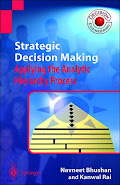BUSINESS METHOD PATENTS IN US, EUROPE AND INDIA –
(These are conclusions from my project report completed last year for the diploma in IPR from NLSUI (Bangalore) - send me a message with your email for the pdf)
Conclusions and Further Issues
· The Software and Business Method patents are already in existence in the world. In the US, these are clearly defined and overtly explained which at least is much better than the European and Indian approach where the legislation regarding software as such has created an option of getting Patent Rights on software and business methods by reframing or redrafting the claims.
· The Business method patents, although granted – either overtly in US or covertly in India/Europe, have been plagued with major controversies regarding prior art, non-obviousness and usefulness – the three main criterion of classical patent frameworks.
· It has been shown in this report that software and business method inventions are radically different than the classical products in chemical, mechanical or hardware fields. These differences are clearly visible as software and business method inventions deals with concepts, data, information, knowledge, decision-making, calculations, computations and abstract models whereas the tangible traditional products are more about physical manifestations of the ideas.
· Business methods and software needs a fresh approach for evaluating the Intellectual Property Rights as these inventions cover hitherto unknown and un- chartered waters in the IPR Legal frameworks across the world. The history of Patent system and its drivers over many years – which include philosophical aspects of propagating inventive capabilities, and creating a reward system for inventiveness will be served much better by looking at the unique characteristics of Business methods.
· We propose a paradigm shift. The Business Method Rights – a new form of Intellectual property proposed here, can help rectify some of the existing ills with respect to Patenting of Business Methods. These Rights are based on the understanding that inventions are to be protected at the abstract level rather than mere implementations. The clear articulation in terms of operations (e.g, processing, communication, representation/storage), operands (e.g. data, information, knowledge) and quality attributes (e.g. reliability, performance, security, fault tolerance etc) is a unique proposition that will help clear identification of inventions in these fields.
· patent criterion of Novelty is the only criterion retained. The non-obviousness and usefulness criteria, we believe in software and Business methods fields are actually a hindrance to innovation rather than facilitators and they do not any way serve the main purpose of looking at obviousness as there do not exist “the person skilled in art” who knows all the knowledge of the art but is absolutely non-creative or has no thoughts of his own about the field.
· This is a fresh attempt and approach to look at the issues from India centric perspective on the new fields where IP laws have not been debated and where there are less historical perspectives. We believe that this report will at least start a fresh debate and let the authorities approach these technologies with an open mind rather than limiting ourselves in the existing frameworks.

No comments:
Post a Comment